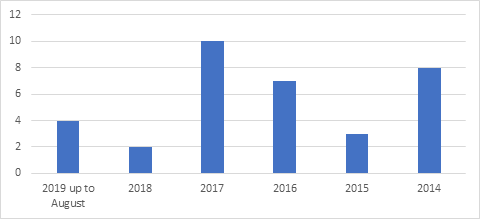Increasing impact: Malaria publications in PLOS Medicine, 2014-2019: PLOS Medicine 15th Anniversary
In celebration of 15 years of PLOS Medicine, Specialty Consulting Editor Lorenz von Seidlein analyzes the impact and popularity of high quality malaria research articles in the last 5 years.
Since January 2014, PLOS Medicine published 59 articles that focused on malaria, as suggested by the words “malaria” or “Plasmodium” in the title. Of the 59 publications, 35 (59%) were research papers and the rest were classified as reviews, perspectives, policy discussions or essays. The number of papers with a focus on malaria varied considerably from year to year (Fig 1).
Fig 1: Number of malaria research articles published in PLOS Medicine since January 2014

Assessing the popularity of papers is tricky, as papers accumulate views and citations over time. The article entitled “Efficacy and safety of the RTS,S/AS01 malaria vaccine during 18 months after vaccination: a phase 3 randomized, controlled trial in children and young infants at 11 African sites” by the RTS,S Clinical Trials Partnership published in July 2014 made the most impact in terms of views (48,271) and citations (184) by August 2019. Although the enthusiasm for RTS,S/AS01 has cooled off, the quest for a highly protective malaria vaccine that can confer long term immunity apparently remains one of the most magnetic topics in malaria research. The second most frequently viewed and cited malaria paper was a Policy Forum by Chen and co-workers entitled “Asymptomatic Malaria: A Chronic and Debilitating Infection That Should Be Treated,” published in January 2016, which was viewed 21,763 times and cited 76 times by August 2019. The collection of seven “MalERA” reviews published in November 2017 was also highly popular, with the lead paper by Rabinovich et al viewed 13,957 times and cited 38 times by August 2019.
Quantifying the views and citations a paper receives is not free of controversy. High numbers of views and citations suggest that a paper is recognized by the malaria community, but it neither confirms the veracity nor the long-term impact of the publication. Personally and subjectively there have been four papers over the last five years which are stuck in my memory: a) “Communicating and monitoring surveillance and response activities for malaria elimination: China’s 1-3-7 strategy” by Jun Cao and co-workers, which describes the strategy used by China to eliminate malaria one of the most astonishing achievements in public health; b) “Effectiveness of Seasonal Malaria Chemoprevention in Children under Ten Years of Age in Senegal: A Stepped-Wedge Cluster-Randomised Trial” by Badara Cissé et al., which used an ambitious step wedge trial design to evaluate an extension of seasonal malaria chemoprophylaxis to include older children; c) “Haemolysis in G6PD Heterozygous Females Treated with Primaquine for P. vivax Malaria: A Nested Cohort in a Trial of Radical Curative Regimens” by Cindy Chu et al., which continues to contribute to the discussions how 8-aminoquinolines can be safely integrated in the routine management of vivax malaria and d) “Housing Improvements and Malaria Risk in Sub-Saharan Africa: A Multi-Country Analysis of Survey Data” by Lucy Tusting et al., which promotes the idea that physical separation via housing improvements of the vector from the human host could provide alternative malaria control strategies, which is highly topical in view of increasing parasite resistance against antimalarials and vector resistance against insecticides.
 Lorenz von Seidlein has worked for 20 years on malaria and other issues in global health. Lorenz is currently coordinating a malaria elimination project with the Mahidol Oxford Research unit in Bangkok, Thailand. He is a Specialty Consulting Editor for PLOS Medicine.
Lorenz von Seidlein has worked for 20 years on malaria and other issues in global health. Lorenz is currently coordinating a malaria elimination project with the Mahidol Oxford Research unit in Bangkok, Thailand. He is a Specialty Consulting Editor for PLOS Medicine.
